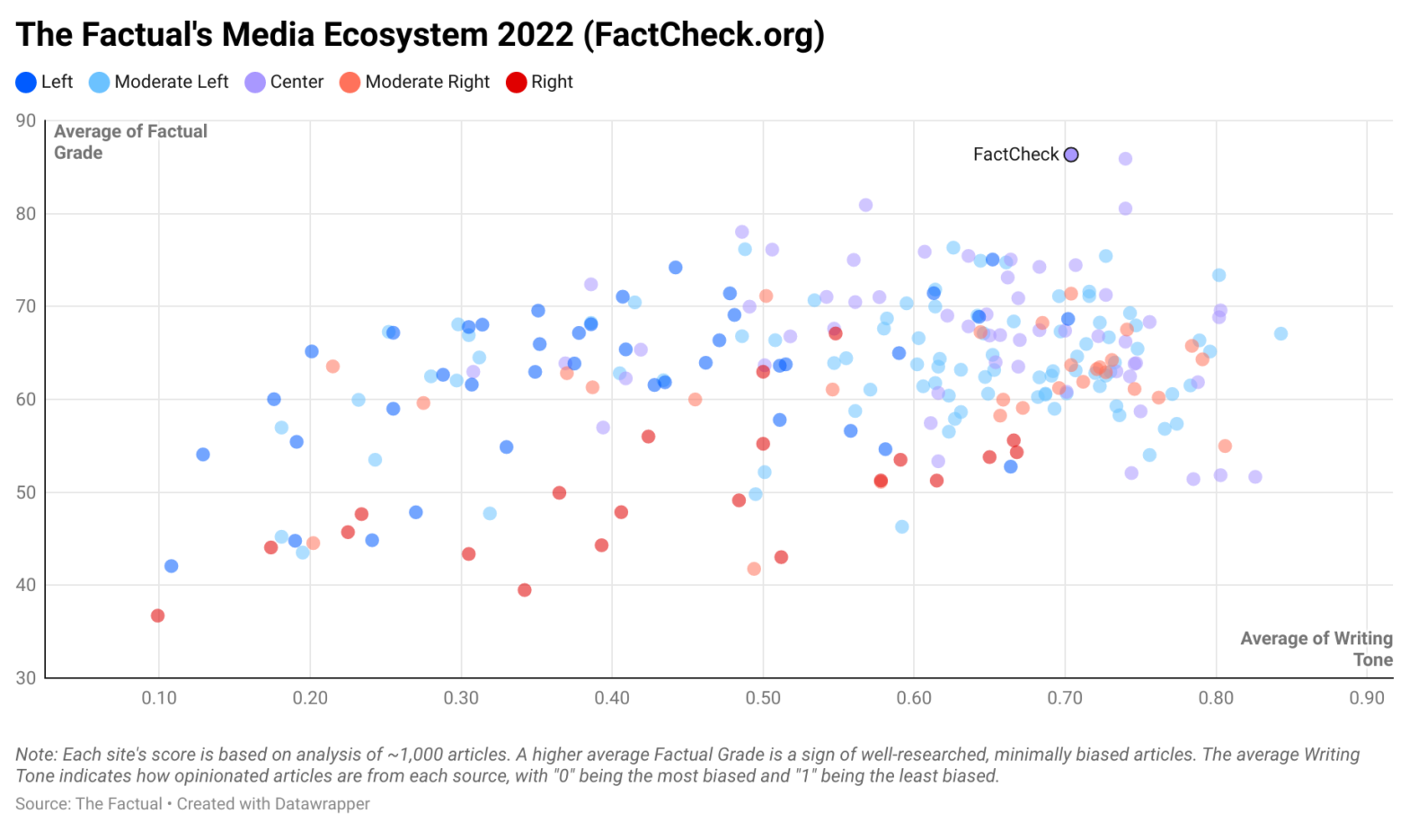FactCheck.org is one of the most prominent organizations, alongside sites like Politifact and Snopes, that endeavors to help readers determine what is true and false online. The site has sought to be a voice of neutrality and reason in recent years, including in turbulent times for the online news space, such as during Covid-19 and the 2020 U.S. presidential election. So, how reliable of a source is FactCheck.org?
How Does The Factual Rate News Sources?
The Factual analyzes more than 10,000 news stories every day to help readers find the most informative, least-biased articles. Our news-rating algorithm scores each article along four metrics: (1) cited sources and quotes, (2) publication history, (3) writing tone, and (4) author expertise. These scores combine in a weighted average we call a Factual Grade, which ranges from 0–100%. (See our How It Works page to learn more about our algorithm.)
For this study, we analyzed ~1,000 articles each from 240 news sources. The average Factual Grade for the entire dataset was 62.5%. Based on these averages, we can compare the performance of news sites across the media ecosystem. The entire dataset can be explored in greater detail here.
How Factual Is FactCheck.org?
FactCheck.org scored an average Factual Grade of 86.3%, the highest average score in our entire dataset. Our data shows that articles from the site score extremely well on multiple dimensions. Articles are written by authors with topical expertise, meaning individuals who routinely cover the same topic in detail. Articles are exceptionally well sourced, meaning they not only feature numerous links to external sources, but these sources are often from a diverse array of sites. And finally, articles generally use a neutral tone, seeking to convey information, not opinion.
Like any news source, scores for articles from FactCheck.org varied widely based on factors like author expertise and cited evidence. For example, many scored above 90%, while others scored below 70%.
Please check your email for instructions to ensure that the newsletter arrives in your inbox tomorrow.
How Opinionated Is FactCheck.org?
One of the metrics The Factual uses is the Writing Tone, which measures how opinionated the writing is in an article. For this metric, the algorithm looks for signs of subjective commentary (e.g., first person pronouns and unnecessary adverbs), as well as the emotional nature of selected words, and sees how prevalent they are for a given length of text. More neutral text receives higher ratings, with “0” being the most opinionated and “1” being the most neutral.
FactCheck.org had an average Writing Tone score of 0.70, placing it in the 75th percentile in our dataset. This suggests that articles from FactCheck.org largely use a neutral tone and avoid using opinionated language. This can be seen in article titles such as “Timeline of Trump’s COVID-19 Comments” and “Facebook Post Misleads on Bipartisan Capitol Attack Report and Interview.”
What Is the Political Bias of FactCheck.org?
The Factual classifies news sites by political bias as either Left, Moderate Left, Center, Moderate Right, or Right. This classification comes from third-party assessments from media bias organizations such as AllSides and Media Bias/Fact Check (MBFC). Based on this data, The Factual assigns FactCheck.org a “Center” bias.
AllSides rates FactCheck.org as “Center,” according to an independent review and 14,796 community ratings. However, AllSides notes that the site may at time exhibit a left-leaning bias. During their 2020 review, they documented a disproportionate number of articles focusing on former president Trump and other top Republicans, though they note this could be because these individuals were the “most major political players at the moment.”
MBFC rates FactCheck.org as “Least Biased,” its rating for centrist sources. They give the site credit for “minimal bias and [using] very few loaded words” as well as what they call “impeccable sourcing of information.” MBFC trusts the source for its own fact-checking needs and says: “Quite simply, Factcheck.org can be trusted to provide accurate fact checks with minimal bias.”
Who Owns FactCheck.org?
FactCheck.org is a project of the Annenberg Public Policy Center and receives funding from the Annenberg Foundation, a philanthropic organization “dedicated to addressing the critical issues of our time through innovation, community, compassion, and communication.” Additional funding for the organization now comes from independent contributions. FactCheck.org maintains stringent transparency measures that require the public identification of all donations that exceed $1,000.
Please check your email for instructions to ensure that the newsletter arrives in your inbox tomorrow.
Why Does It Matter?
News articles alway have some bias because all authors have some frame of reference within which they describe a story. Political bias ratings are helpful in understanding this framing. However, it can be more beneficial to know how factual an article is based on quantifiable metrics that can be seen across the media ecosystem, such as cited evidence, author expertise, and writing tone. This is what The Factual ascertains.
Reading several, highly rated articles from across the political spectrum helps counter the bias of any news source or story. To have the day’s most factual news stories delivered to your inbox every morning, subscribe to our daily newsletter.
Article updated on September 15, 2022 to reflect new data.

